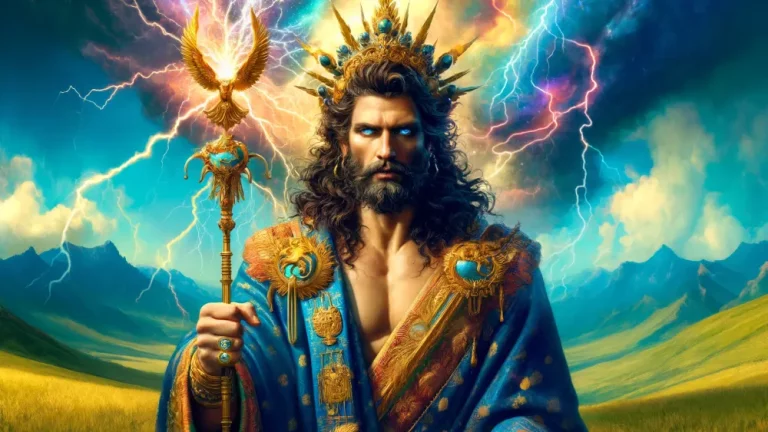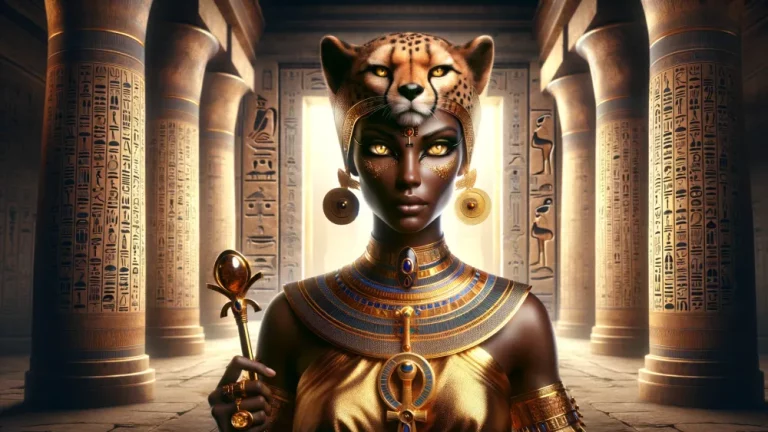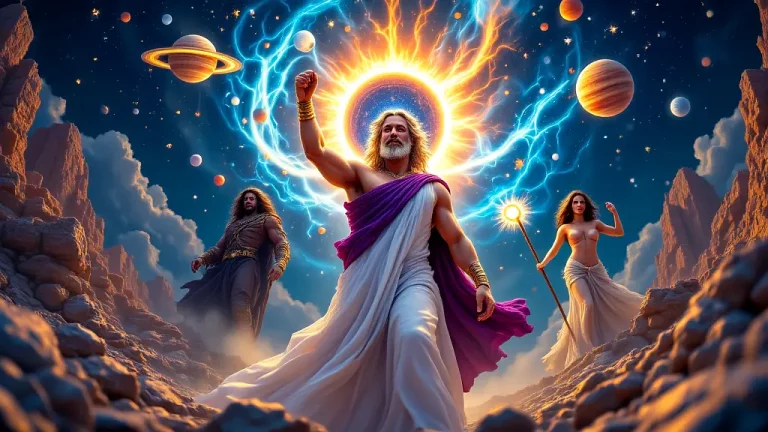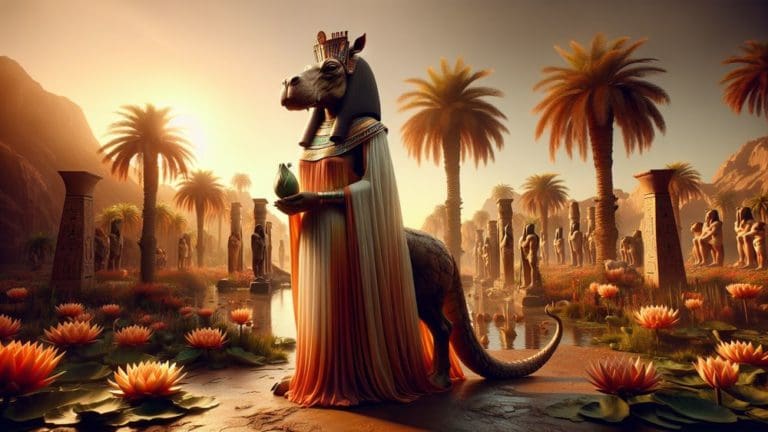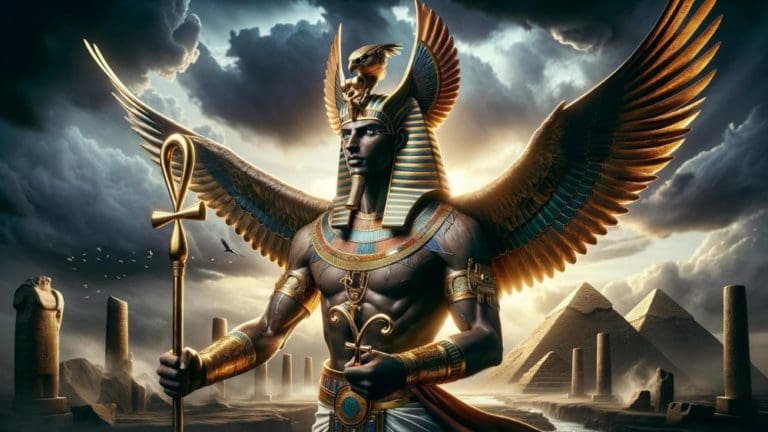Muso Koroni: The Powerful And Mysterious Goddess Of Mali
Muso Koroni is a mysterious figure in stories from West Africa. However, her name is not as well-known as the gods and goddesses from other ancient beliefs. She is mainly found in the beliefs of the Bambara people in Mali.
Key Points:
- Muso Koroni is a goddess from the Bambara people of Mali, tied to chaos, destruction, fertility, and female power.
- People connect her with the hyena, an animal seen as wild, uncontrolled, and representing constant change in nature.
- Unlike many goddesses, she is not only a creator but also one who destroys, similar to Kali from Hinduism or Sekhmet from Egyptian myths.
- Some believe she shaped humanity by bringing struggles like famine and disease, forcing people to become stronger.
- Rituals and sacrifices, including offerings of animals and red ochre, were performed to calm her power and seek protection or blessings.
- Unlike peaceful goddesses, she is feared and respected for her unpredictable and untamed nature, not for nurturing or guiding people.
- Her myths highlight that destruction and chaos are not just about loss but also lead to renewal and change.
People describe her as a force of confusion and destruction, something old and powerful that is connected to both ruin and birth. Many goddesses are only known for protecting people or taking care of them, but Muso Koroni is different. In the spoken stories of Africa, she comes across as both a creator and a destroyer.
Like other gods from different traditions – such as Kali from Hindu stories or Sekhmet from Egyptian myths – she is powerful. People respect her strength, yet they also fear her anger. Still, African myths are told by speaking instead of being written down in one place. Because of this, no one version of Muso Koroni’s story exists.
The way people describe her changes in different places, and over time, her role shifts as well. In many books and studies, gods from places like Greece, Rome, or Egypt are given more attention.
On the other hand, the stories of Muso Koroni are not discussed as much outside of West African traditions. Even so, her effect on what people believe – especially about how destruction and new life are connected – remains deep and lasting.
Muso Koroni: Overview and Key Facts
| Aspect | Details |
|---|---|
| Origin | Muso Koroni comes from the myths of the Bambara people in Mali. |
| Role | She is an ancient goddess linked to chaos, destruction, fertility, and female strength. |
| Important Meaning | People connect her with the hyena, which they see as an animal that represents things wild, uncontrolled, and always changing. |
| Nature | She is not just a creator, she is also a destroyer. People say this makes her similar to Kali in Hinduism and Sekhmet in Egyptian mythology. |
| Connection to Humans | She had an effect on the early beliefs of the Bambara people. According to stories, she shaped people, affected their fate, and dealt with spirits. |
| Worship and Offerings | People gave sacrifices and performed rituals to calm her power because they both respected and feared her. |
| How She Compares to Other Deities | Some powerful African goddesses, like Nyame, Oshun, and Mawu, have a few things in common with her. But Muso Koroni is more connected to destruction. |
| Link to Death and Starting Over | Because she destroys, her power also has something to do with renewal and change. |
| Cultural Importance | Most people outside of West Africa have never heard of her. Still, her stories explore big ideas about power, women, and the way nature keeps its balance. |
Who is Muso Koroni? The Forgotten Goddess of Mali
Muso Koroni had great power and was very important in the beliefs of the Bambara people. But outside of those traditions, people do not talk about her much, and she is not as well known as other gods. If you compare her to other ancient deities, it is clear that she has not received the same attention.
If you want to understand who she really was, then you have to look at how her story started, the things that represented her, and the stories people told about her. These stories explain how she shaped people’s lives a long time ago.
Where Did Muso Koroni’s Story Begin?
In the stories of the Bambara people of Mali, Muso Koroni is said to be very old, existing before the world had any order. People describe her as connected to chaos, destruction, and strong female power, and her role in ancient stories is important. While some deities are mostly creators who bring structure and peace, Muso Koroni is different.
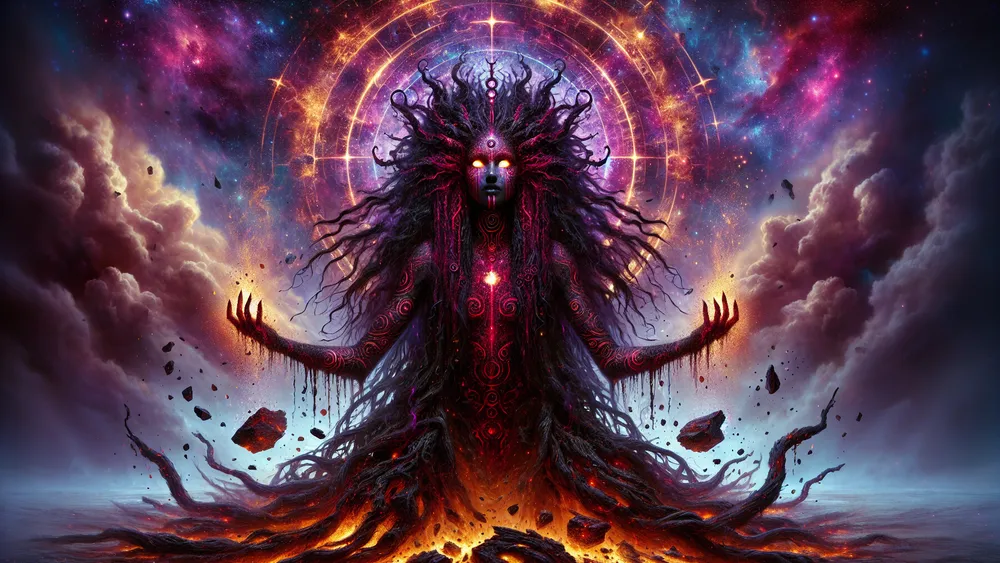
Her connection to forces that break things apart means that she is part of both ending and beginning. Some versions of her story say that she is both the mother of the world and its enemy, refusing to accept balance and structure. This view makes her similar to other gods from different cultures.
For example, Tiamat from Mesopotamian stories had a part in both making and destroying, while in Greek tradition, Nyx was a goddess who existed before the world became organized. Different people tell Muso Koroni’s story in different ways. Yet, most describe her as a being that had to exist for everything else to take shape.
Because of her actions, there was a fight between creation and destruction. This idea is important in many African beliefs about the universe.
Muso Koroni, in the stories of the Bambara people, is a powerful force of chaos, destruction, and female strength, playing a key role in both the world’s creation and its disruption, much like other ancient deities linked to both making and breaking.
What Muso Koroni Stands for and Her Abilities
In stories from the Bambara people of Mali, Muso Koroni represents destruction, chaos, and renewal – three forces that go against balance and order. Unlike gods who create things and bring stability, she stands for the wild and uncontrolled parts of existence. People also connect her with nature, especially animals that represent unpredictable and instinctive behavior. The hyena is one of these creatures.
In many African traditions, the hyena is seen as both clever and powerful. It is a creature that moves between life and death, which matches how Muso Koroni is both a destroyer and a force that brings change. However, she is not just about breaking things.
She also has a connection to fertility and women’s strength, though not in a way that is tied to caring for others. Many believe she represents a kind of womanhood that does not follow traditional rules. Instead of being a nurturing mother, she is a being with power of her own who controls life, fate, and the world around her.
Some compare Muso Koroni to other gods, like Kali from Hindu beliefs, who is known for both destruction and rebirth. But Muso Koroni is also believed to have real abilities, not just symbolic meaning. Many say she can influence fate, change the world in spiritual ways, and even cause natural disasters when she is not pleased.
The list below explains important things about Muso Koroni:
- Hyena – A feared and respected sign of disorder, change, and uncontrolled forces.
- Fertility – Creation happens through destruction, and she is linked to a powerful kind of female energy.
- Chaos and Destruction – She does not bring order; instead, she is both an end and a beginning.
- Wild Nature – Connected to places and events people cannot control, such as storms and dangerous landscapes.
- Female Strength – A symbol of women’s independence, standing against expectations of submission.
- Spiritual Power – Thought to affect both people and spirits, deciding their futures in ways that are not always understood.
How Muso Koroni Helped Shape Humanity
In the stories told by the Bambara people, Muso Koroni is not a kind creator of humans. Instead, she is a force that brings struggle and change. People say she made sure the world was difficult, so that no person could live without challenges. Some gods create humans with kindness and protection, but she did something different. Instead of giving comfort, she made life full of difficulties.
This led to humans becoming strong and able to survive. Some versions of her story explain that she placed famine, disease, and bad luck across the land. People had no choice but to get stronger by fighting through these problems. In this way, she is like Prometheus from Greek myth, who gave people fire but also caused them to suffer because he acted against the gods.
Without Muso Koroni’s actions, people might have stayed weak and dependent, but because of her, they had to always struggle and change.
She also had a strong connection to spirits that could affect people’s lives. Different stories describe her living in both the real world and the world of unseen things, meaning she could control fate. Some say she was the mother of wild spirits, beings that did not follow rules. These spirits did not always harm people, but they also did not always help them.
They could bring fortune or disaster at any time, and because she controlled them, people believed their lives depended on her choices. Unlike gods who kept balance in the universe, she did things without warning. This made people believe that fate itself was random and not always fair. Although many feared her, Muso Koroni’s role was still seen as important. Without difficulty, there could be no success.
Without things breaking down, new things could not be built. She made sure that humans always had to think about both life and disaster at the same time. Some stories say she even gave people an understanding of unpredictability, and by doing this, she allowed them to find their own way.
Because of her, humans became wiser, more determined, and able to face the unknown.
Muso Koroni and Other African Goddesses
She is one of the strongest deities, and her power is hard to control and able to change things. If we want to see why she matters, we can look at her beside other goddesses and compare how myths describe women, death, and rebirth. Some deities are linked to peace. Others are tied to creation.
But Muso Koroni, like specific other figures in African mythology, carries a mix of forces that destroy and create at the same time.
How Muso Koroni Compares to Other African Goddesses
In Bambara beliefs, Muso Koroni stands for chaos, destruction, and change. Many other African goddesses have power, but they are linked to different things, such as creation, knowledge, and balance. Some bring peace. Others help the world grow. She does something else. Mawu, a goddess from the Fon people, is connected to the moon, wisdom, and kindness.
These things are very different from Muso Koroni’s wild and destructive ways. Oshun, a Yoruba goddess of love, fertility, and rivers, is usually described as caring and kind, but when she is treated badly, she becomes angry and seeks payback. Muso Koroni, however, is not linked to nurturing at all.
Instead, she represents a strong kind of woman’s power that stands on its own. Among the Akan people, Nyame is the most powerful god. One part of Nyame is female, called Nyame Ani, and she controls the fertility of the world. This is similar in some ways to Muso Koroni, though her idea of fertility is more primal and untamed.
In some stories, Asase Ya, the mother of Anansi, is called a goddess of earth and crops. She keeps things stable, unlike Muso Koroni, who brings destruction. Even though these goddesses have many differences, they all have some effect on human fate, balancing creation with destruction.
The table below gives a summary of important differences and similarities:
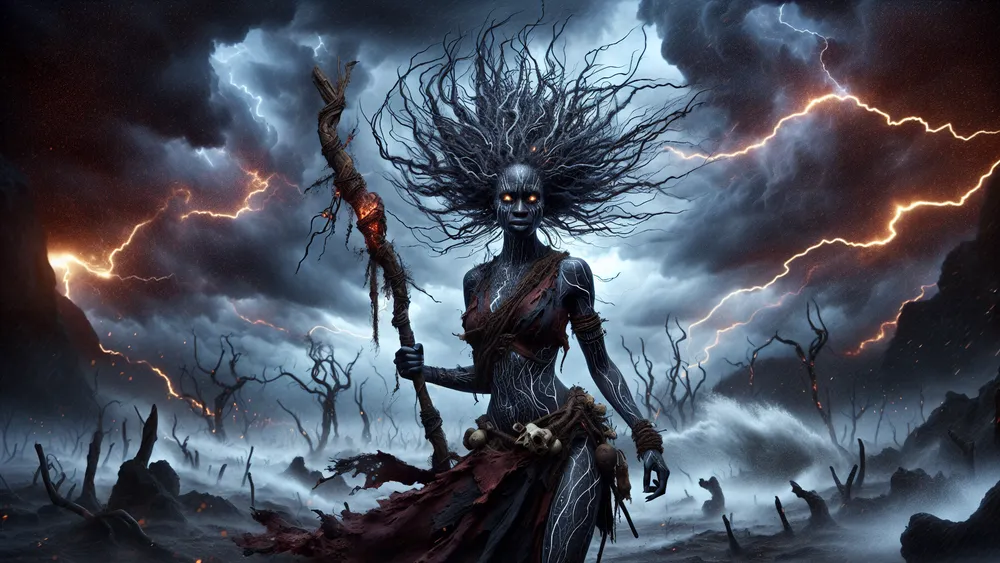
| Goddess | Origin | What They Rule | Important Symbols | Key Traits |
|---|---|---|---|---|
| Muso Koroni | Bambara (Mali) | Chaos, Destruction, Fertility | Hyena, Wild Nature, Storms | Fierce, Independent, Hard to Predict |
| Nyame (Nyame Ani) | Akan (Ghana) | Creation, Sky, Earth’s Fertility | Sky, Earth, Cosmic Order | Most Powerful, Both Male and Female, Wise |
| Oshun | Yoruba (Nigeria) | Love, Fertility, Rivers | Water, Gold, Honey | Caring, Attractive, Protective but Can Seek Payback |
| Mawu | Fon (Benin) | Creation, Wisdom, Moon | Moon, Night Sky, Motherhood | Peaceful, Smart, Gives Life |
| Anansi’s Mother (Asase Ya) | Akan (Ghana) | Earth, Agriculture | Soil, Crops, Growth | Reliable, Keeps Life Going, Helps People Survive |
Muso Koroni’s Influence on Women in Mythology
In many African myths, female gods have great power. Some are connected to both creation and destruction at the same time, meaning they do not follow the usual ideas of goddesses as caretakers. Muso Koroni is an example of this because she represents something wild and free, not tied to what people expect from female gods.
Mawu, a goddess from the Fon people, is kind and linked to wisdom and the moon. Muso Koroni is not like her. Instead of being gentle, she was feared because she had power and was not controlled by anyone. Many myths have strong women like her, who are respected and also seen as dangerous.
In Egyptian beliefs, Sekhmet was a goddess of both war and healing, meaning people saw her as two opposing things at once. Muso Koroni is the same in one way: she was not a protector, but people respected her because of how much her presence shaped their world. Her strength was not given to her to help others. It existed because she could change things and break them apart.
In some oral traditions, people did not see Muso Koroni as someone they could please. Unlike motherly goddesses, she was not seen as a guide. Instead, she was part of the world in a different way, one that people had no control over. Certain rituals were done so she would not become angry, not to ask for her help.
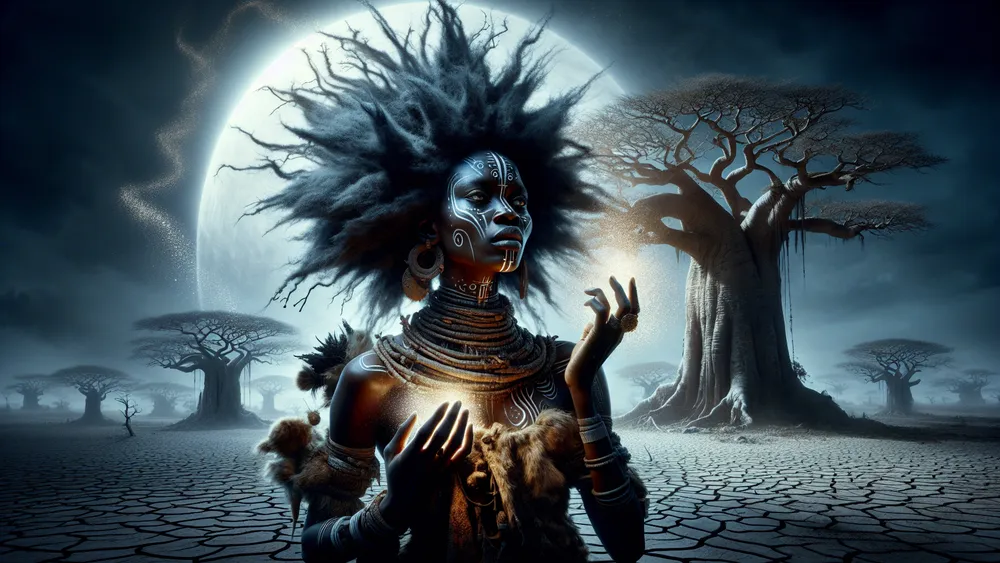
This idea appears in many West African myths, where women gods have their own power, not just as companions or helpers to male gods. The way people describe her goes against the idea that all female gods give life. She did not just create – she also destroyed.
This means strength is not about being male or female, but about being able to change the world in a huge way.
Muso Koroni’s Link to Death and Rebirth
Muso Koroni does more than bring chaos. She is also part of renewal, something seen with other powerful figures in mythology like Kali in Hinduism and Sekhmet in Egypt. In Bambara stories, people talked about how she destroyed the past to make space for the future.
This idea is common in many African beliefs, where destruction is not just about breaking things but is something that needs to happen first before renewal can take place. Many African traditions explain death in a certain way. It is not simply an end, but something else, a step before something new happens, whether in another world or in the physical one.
Some stories say Muso Koroni had a part in this process. People believed that change could only happen because of forces like hers, which cleared away what was old. Some thought of her storms and rage as things that destroyed – not because they were pointless but because they allowed life to start again. There are other myths with ideas like this. Sekhmet could spread plague and disaster, but she could also bring health.
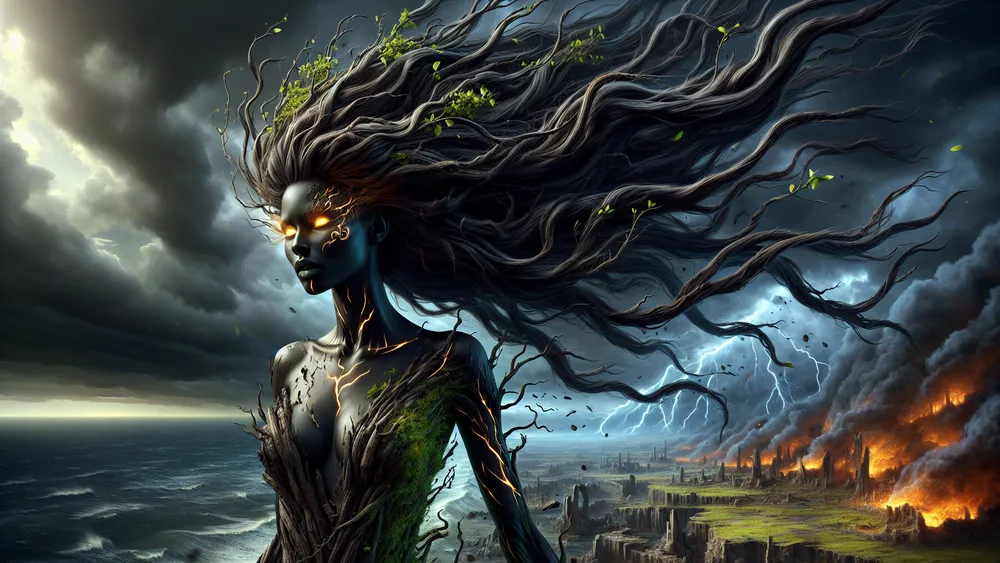
Muso Koroni, while feared, was also seen as something necessary, a force that made sure everything kept moving and nothing stayed the same for too long. Some said that rituals were done, not to ask her for help, but to make sure she wouldn’t become angry. What people believed about her was clear: She did not protect like other goddesses. But she still mattered.
For many, stagnation – the idea that nothing would change, that things would stay the same forever – was worse than destruction. Muso Koroni made sure that never happened.
Muso Koroni was feared for her destruction, but people saw her as necessary because she made sure old things were cleared away so new things could start.
Tales of Muso Koroni’s Divine Wrath
Muso Koroni’s power was not just something people imagined. It was real. It was felt by everyone, and it shaped the world in ways no one could ignore. People tell stories about moments when she used her anger. Some say entire groups suffered because of her, that hunger spread and lasted a long time.
Others tell of wars that started because of her actions, times when leaders rose and fell because she willed it. Not everyone feared her. Some respected her, but most knew that when she acted, nothing could stay as it was before.
The Story of Muso Koroni and the Great Famine
People tell a story about Muso Koroni’s great anger. It was when she sent a terrible famine to the land. Many believe it was because the people of a wealthy kingdom had forgotten the balance that the gods wanted. They took too much from the land, used up the fields, and hunted without care. Worse, they did not respect the spirits.
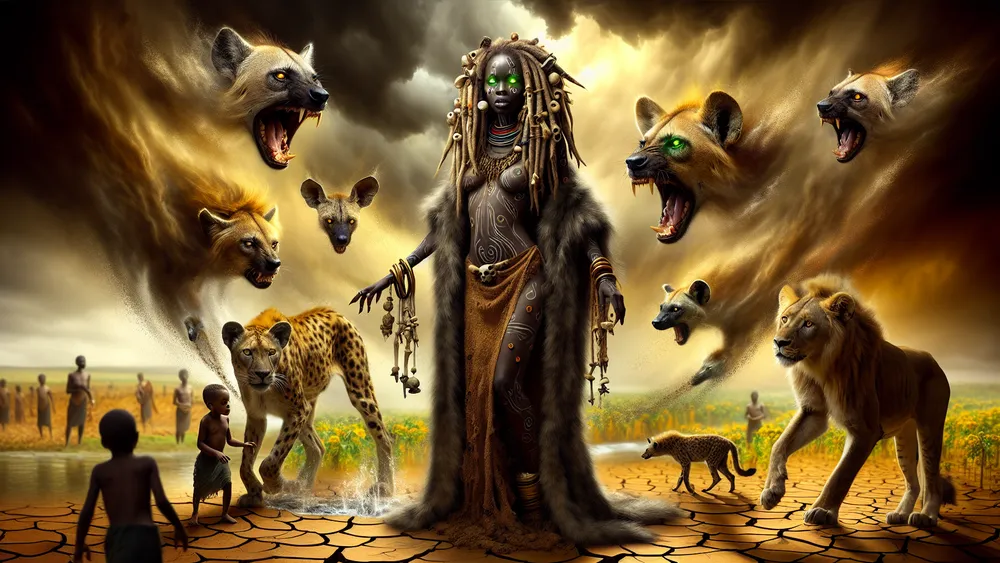
Because the people had forgotten, Muso Koroni was angry. She took away her favor. A strong, hot wind came, making the land dry. The rivers became smaller, the soil became useless, and no crops would grow. Without rain, food was lost. People became weaker. The sick grew in number. Even those who had been strong soldiers were thin and without power.
Villages were filled with the sound of crying children. The elders saw what was happening. They said Muso Koroni wanted something. If the king did not act, the kingdom would not survive. The king, not knowing what else to do, asked the village diviners for help. They gave him an answer: Muso Koroni would not accept simple gifts like food or animals.
She wanted people to admit they were wrong and prove they understood balance. So, the king had the people prepare a great ritual at night. Everyone came together. They prayed. They spoke about the mistakes they made. And they made a big offering: a sacred black hyena, an animal tied to Muso Koroni. Some believed that Muso Koroni ignored them at first.
She did not send rain immediately. They waited. It was a test. She wanted to see if they really meant what they said. Then, a great storm came. The rain poured. The land changed again, and the famine ended. This story means that Muso Koroni was not only someone who caused chaos. She also made sure people respected nature.
She could harm, but she could also fix things. What mattered was balance. Many African myths talk about gods this way. They were not only good or bad. They had power over both creation and destruction, making sure things would always return to balance in the end.
The Warriors Who Drew Strength from Muso Koroni
The Bambara people of Mali had stories about Muso Koroni. She was not only a bringer of destruction. She was also a source of wild power. Some warriors believed that calling on her before battle made them stronger. Before the fight, they gathered. They met at night in sacred places. There, they performed rituals tied to Muso Koroni. One ritual required them to wear hyena pelts.
Another had them create a loud, rough chant. Some said this chanting brought out their wild side. Some believed those who did this right lost control but gained power. Their enemies feared them. People thought they fought like gods controlled them. Some said they feared these warriors more than death itself. Stories say they could still be defeated, but they were hard to fight.
They did not hold back. Some other cultures had similar beliefs. Norse berserkers believed they got their strength from Odin. Kali’s followers in India thought destruction was part of existence. The warriors of Muso Koroni believed strength came from chaos. But it was dangerous. This power was not free to use. Whoever used it without respect could lose their mind.
Some forgot where they were in battle. Others went mad. She gave power, but only to those who understood how to use it.
Rituals and Offerings to Muso Koroni
To respect Muso Koroni, people had to do more than just speak. Words alone were not enough. They believed that keeping her from being angry meant following exact rituals and giving important offerings. Her power was not simple, so they needed to be careful. They gave gifts and sacrifices, afraid of what would happen if they did not. Some were small, like food.
Others were much bigger, meant to calm Muso Koroni’s power, reminding her that they feared and respected her. People wanted her help and protection, and they believed that she would listen if the rituals were done correctly. These acts were not random choices. They were performed with care because they mattered greatly.
Ancient Practices and Sacrifices for Muso Koroni
In the Bambara tradition, people performed rituals for Muso Koroni when problems arose. When they feared her great anger or wanted her help, they turned to these traditions. A big part of these rituals was the use of blood sacrifices. People believed that sacrificing certain animals, like black hyenas or goats, could send messages to gods.
These animals were connected to Muso Koroni’s power. With the help of a spiritual leader or elder, a ceremony took place. They called upon Muso Koroni through drumming, chanting, and offering things like millet beer and kola nuts. Some stories say warriors went to sacred groves before battle. Women who hoped to have children went there, too. It was believed that these places held Muso Koroni’s strongest power.
Those who visited covered their bodies with red ochre, which meant they were connected to her. These rituals were not just about respect. They were part of an important exchange. People thought Muso Koroni had great power, and they feared what she could do. Doing the ritual wrongly or without true respect meant she might punish them instead of protecting them.
Symbols and Sacred Objects Linked to Muso Koroni
Muso Koroni was strongly connected to different symbols. Each one meant something different about her control over creation, destruction, and female power. People used these symbols in rituals, painting them on objects, wearing them for protection, or offering them as gifts. The color red was important in her worship.
Since it was connected to blood, fertility, and destruction, it was often painted on people’s bodies during ceremonies. The hyena was thought to be her sacred animal. People believed this because of the way it scavenged and its strange laugh. It was often included in images of Muso Koroni, as it meant she was wild and hard to control.
Some shrines had bones and iron objects, which people thought connected her to death and change. Others believed her power was strongest near baobab trees, where they often left gifts for her.
Some important objects connected to Muso Koroni included:
- Hyena figures or skins – People thought these meant she was wild and unpredictable.
- Red ochre – Used on people’s bodies in rituals to call on her.
- Iron tools or weapons – Thought to be linked to destruction and protection.
- Animal bones – Placed in shrines to connect to life, death, and starting again.
- Baobab trees – Seen as places where her power was strongest, and offerings were left.
These objects did not exist just for decoration. People used them in rituals because they thought Muso Koroni’s power could be dangerous or helpful depending on how they approached her.
Ways People Sought Muso Koroni’s Protection
People who believed in Muso Koroni thought keeping her calm through careful rituals was the only way to make sure she helped. They wanted protection, children, or even revenge against enemies. Women who wanted children gave her red ochre mixed with water because people thought it meant life, like blood.
In sacred groves where they believed she was, they rubbed it on their skin. Warriors had a different way. Before battle, they prayed to Muso Koroni and gave sacrifices. They killed animals like hyenas or goats, thinking this would make her power part of them. Some believed that burning baobab leaves and incense from acacia while saying her secret names meant they could see ways to defeat their enemies.
But these rituals were not safe. People thought a mistake could make Muso Koroni angry instead of helpful. Old stories tell of whole villages suffering because people forgot or ignored the right steps. Believing in Muso Koroni was not just about respecting her – it had to be done exactly right. A mistake meant serious punishment.
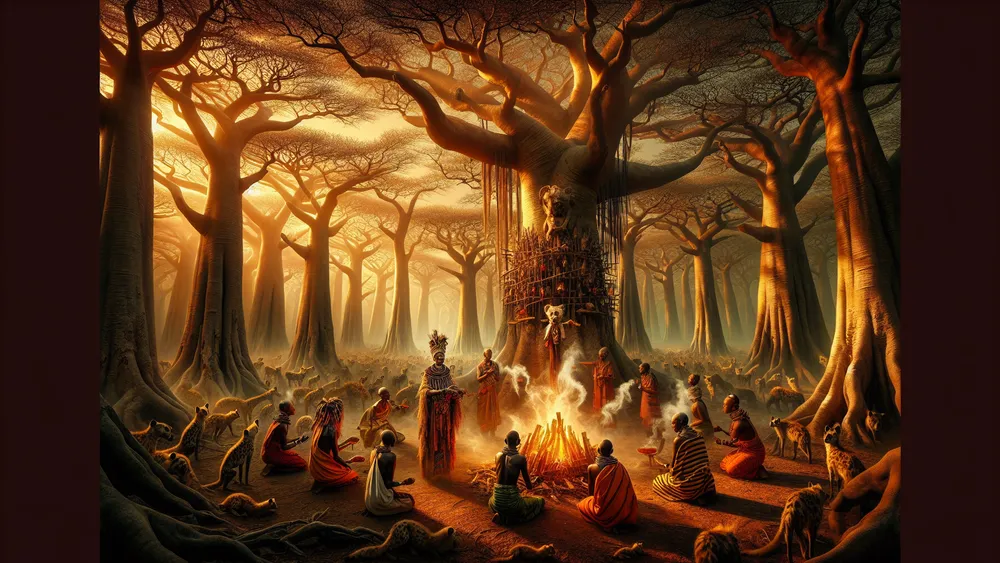
People believed Muso Koroni would help them if they followed rituals exactly, but any mistake could make her punish them instead.
The Pantheon of African Mythology
African mythology includes many gods, spirits, and powerful beings. These figures are different depending on the region or ethnic group. Though Muso Koroni is important in Bambara traditions, she is part of a larger religious system with many different gods across Africa. Among them are Nyame, worshiped by the Akan people, Mawu-Lisa, who is known in Fon beliefs, and Olorun, from Yoruba traditions. Each group understands divine forces in a different way.
Some gods are connected to creation and peace, while others, like Muso Koroni, are linked to change and chaos. Different gods are part of many African traditions. To learn about all the gods that people have honored, you can visit this full list of African gods, which gives a large collection of gods and their roles in different traditions.
FAQs
1. What was Muso Koroni’s most famous myth?
Muso Koroni’s most famous myth tells of how she, as a primordial force of chaos, unleashed a great famine upon the land, forcing humans to acknowledge her power and seek her appeasement through ritual offerings.
2. Was Muso Koroni considered a goddess or a demon?
Muso Koroni was considered both a goddess and a chaotic force, embodying primordial destruction, fertility, and untamed female power.
3. Are there any African tribes that still honor Muso Koroni?
Some African tribes that still honor Muso Koroni preserve her memory through oral traditions, though formal worship has largely diminished over time.
4. How does Muso Koroni compare to destruction goddesses of other mythologies?
How Muso Koroni compares to destruction goddesses of other mythologies lies in her dual nature as both a force of chaos and creation, similar to Hinduism’s Kali and Egypt’s Sekhmet, who embody both destruction and renewal.


